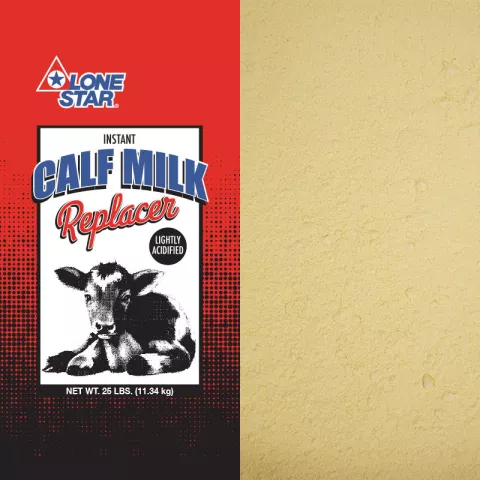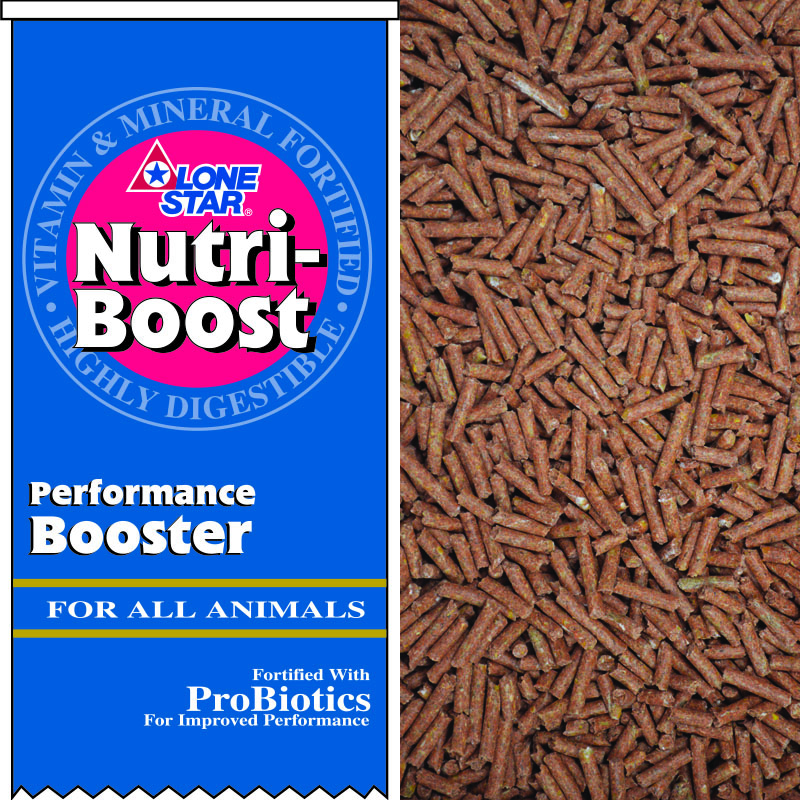
Calf Milk Replacer
Product Number: 2172A milk substitute to be fed to herd replacement calves.
Product Highlights
FEED TYPE
- Meal
INTERNAL HEALTH
- Enhanced with Performance® Direct Fed Microbials (probiotics) that improve digestion, health, and overall performance
- Acidification improves digestion
- Vitamin fortified
FEATURES
- 1744 Kcal/lb
- 22% protein
PHYSICAL SUPPORT
- Easy to use - just mix with warm water
Ingredients
Dried skimmed milk, dried whey, dried whey product, dried milk protein, animal fat preserved with BHT, lecithin, soy protein concentrate, vitamin A supplement, vitamin D3 supplement, dl-Alpha tocopherol acetate (source of Vitamin E), riboflavin supplement, D-calcium pantothenate, Niacin supplement, vitamin B12 supplement, menadione sodium bisulfate complex (source of Vitamin K), choline bitartrate, ascorbic acid, sodium bicarbonate, salt, biotin, folic acid, pyridoxine hydrochloride, calcium pantothenate, sodium selenite, ferrous sulfate, cobalt sulfate, magnesium sulfate, manganese sulfate, copper sulfate, zinc sulfate, ethylenediamine dihydroiodide, citric acid, silicon dioxide, dried saccharomyces cerevisiae fermentation product, dried Enterococcus faecium fermentation product, dried Lactobacillus acidophilus fermentation product, lactose and artifical flavor.
Feeding Directions
Feed colostrum for the first three days. For best results, it is important to get colostrum into the calf as soon as possible after birth. To be sure that the calf receives colostrum, it may be advisable to feed the calf directly rather than allowing the calf to nurse. This first feeding should be 3 to 4 lbs. in the first hour of life. The colostrum should be continued for three days at the rate of about 7-8% of body weight.
After the third day, start feeding Lone Star Calf Milk Replacer according to the directions below. These directions are intended only as a guide. The feeder must use his good judgement when feeding calves. Calves will vary in feed requirements, depending on size or health of the calf. Any changes in feeding level should be made gradually. If a calf scours, milk intake should be restricted or eliminated for one or two feedings.
TWICE A DAY FEEDING: Mix Lone Star Calf Milk Replacer at the rate of 1 cup per 1 quart of warm water (120° F) or 1 pound (4 cups) to 1 gallon of warm water. Mix thoroughly. Feed 1-1/2 to 2-1/2 quarts of the above mixture (reconstituted milk replacer) twice a day, depending on the health and size of the calf. A 100 lb. healthy calf should receive about 2 quarts of the reconstituted milk replacer. Feed Lone Star Calf Milk Replacer as long as you would normally feed whole milk, or until weaning. The calf can be weaned when it meets the following three criteria:
1. Be at least 4 weeks of age.
2. Have gained 20% of its birth weight.
3. Have consumed at least one pound of Lone Star Calf Starter
Developer per day for 3 consecutive days.
Lone Star Calf Starter Developer should be introduced before the end of the first week. It is important that the calf starter be kept fresh. Hay of high quality may be introduced at the end of the second week, but it is not necessary until after weaning. Corn silage should not be fed during the first two months.
CAUTION: Feed should be stored in a well-ventilated, dry area that is protected from rodents and insects. Feed is perishable. Do not feed moldy or insect-infested feed as it may cause illness or death.
Additional Information
| Crude Protein (not less than) | 22.00 | % |
| Crude Fat (not less than) | 10.00 | % |
| Crude Fiber (not more than) | 0.50 | % |
| Calcium (not less than) | 0.70 | % |
| Calcium (not more than) | 1.00 | % |
| Phosphorous (not less than) | 0.60 | % |
| Vitamin A, (not less than) | 32,000 | IU/LB |
| Vitamin D, (not less than) | 12,000 | IU/LB |
| Vitamin E, (not less than) | 20 | IU/LB |
| PROTEIN, not less than | 22.00 | % |
| FAT, not less than | 10.00 | % |
| FIBER, not more than | 0.50 | % |
| ASH, not more than | 7.50 | % |
| DE | 1744.00 | Kcal/lb |
| TDN | 92.00 | % |
| MOISTURE, not more than | 5.00 | % |
| CALCIUM | 0.80 | % |
| PHOSPHORUS | 0.70 | % |
| ARGININE | 0.95 | % |
| HISTIDINE | 0.37 | % |
| LYSINE | 1.84 | % |
| TYROSINE | 0.62 | % |
| TRYPTOPHANE | 0.43 | % |
| PHENYLALANINE | 0.75 | % |
| CYSTINE | 0.21 | % |
| METHIONINE | 0.21 | % |
| THREONINE | 0.61 | % |
| LEUCINE | 1.71 | % |
| ISOLEUCINE | 1.14 | % |
| VALINE | 0.58 | % |
| VITAMIN A (added) | . | 32,000 IU/lb |
| VITAMIN D (added) | . | 12,000 IU/lb |
| VITAMIN E (added) | . | 20 IU/lb |
| THIAMINE | 3.4 | mg/lb |
| RIBOFLAVIN | 25.80 | mg/lb |
| NIACIN | 27.00 | mg/lb |
| PANTOTHENIC ACID | 35.90 | mg/lb |
| CHOLINE | 1752.00 | mg/lb |
| VITAMIN B12 | 20.00 | mcg/lb |
| Trace Minerals (Added) | ||
| MANGANESE | 25.00 | gr/ton |
| IODINE | 1.00 | gr/ton |
| COPPER | 2.00 | gr/ton |
| COBALT | 1.00 | gr/ton |
| IRON | 20.00 | gr/ton |
| ZINC | . | 50 gr/ton |
| SELENIUM | 0.10 | ppm |
Additional Information
| Crude Protein (not less than) | 22.00 | % |
| Crude Fat (not less than) | 10.00 | % |
| Crude Fiber (not more than) | 0.50 | % |
| Calcium (not less than) | 0.70 | % |
| Calcium (not more than) | 1.00 | % |
| Phosphorous (not less than) | 0.60 | % |
| Vitamin A, (not less than) | 32,000 | IU/LB |
| Vitamin D, (not less than) | 12,000 | IU/LB |
| Vitamin E, (not less than) | 20 | IU/LB |
| PROTEIN, not less than | 22.00 | % |
| FAT, not less than | 10.00 | % |
| FIBER, not more than | 0.50 | % |
| ASH, not more than | 7.50 | % |
| DE | 1744.00 | Kcal/lb |
| TDN | 92.00 | % |
| MOISTURE, not more than | 5.00 | % |
| CALCIUM | 0.80 | % |
| PHOSPHORUS | 0.70 | % |
| ARGININE | 0.95 | % |
| HISTIDINE | 0.37 | % |
| LYSINE | 1.84 | % |
| TYROSINE | 0.62 | % |
| TRYPTOPHANE | 0.43 | % |
| PHENYLALANINE | 0.75 | % |
| CYSTINE | 0.21 | % |
| METHIONINE | 0.21 | % |
| THREONINE | 0.61 | % |
| LEUCINE | 1.71 | % |
| ISOLEUCINE | 1.14 | % |
| VALINE | 0.58 | % |
| VITAMIN A (added) | . | 32,000 IU/lb |
| VITAMIN D (added) | . | 12,000 IU/lb |
| VITAMIN E (added) | . | 20 IU/lb |
| THIAMINE | 3.4 | mg/lb |
| RIBOFLAVIN | 25.80 | mg/lb |
| NIACIN | 27.00 | mg/lb |
| PANTOTHENIC ACID | 35.90 | mg/lb |
| CHOLINE | 1752.00 | mg/lb |
| VITAMIN B12 | 20.00 | mcg/lb |
| Trace Minerals (Added) | ||
| MANGANESE | 25.00 | gr/ton |
| IODINE | 1.00 | gr/ton |
| COPPER | 2.00 | gr/ton |
| COBALT | 1.00 | gr/ton |
| IRON | 20.00 | gr/ton |
| ZINC | . | 50 gr/ton |
| SELENIUM | 0.10 | ppm |
